How To Become A Manager – The Ultimate Guide (You Need Now)
Estimated reading time: 13 minutes
This is the ultimate guide for how to become a manager, and what ACTUALLY makes a good manager. You need these tips now!
This post may contain affiliate links, which means I’ll receive a commission if you purchase through my link, at no extra cost to you. Please read full disclosure here.
As an Amazon Affiliate I earn from qualifying purchases.
A LIST OF 10 QUALITIES – HOW TO BECOME A MANAGER
- You Serve Your Employees, Not The Other Way Around
- Own Everything
- Actually Know Your Employees
- Approachability and An Open Door
- Going The Extra Mile
- Understand The Phrase: Work-Life Balance
- Defining and Upholding Clear Expectations
- Create Structure And Organization
- Prioritize Quality Training
- Praise and Understanding
Let’s discuss how you can determine a good manager, become a good manager, or become a better one.
HOW TO BECOME A MANAGER (AND HOW TO BECOME A GOOD ONE)
Employers with happy employees experience massive benefits, which makes it so unbelievable that so many business owners treat their employees poorly…
… and then are surprised when their employees refuse to put up with disrespect and leave.
Now more than ever, people are unwilling to put up with unfair work practices and unethical, immoral, or simply disrespectful bosses.
Therefore, if you are a business owner, or are considering being one at some point in your life, it is imperative that you understand these rules…
(How To Become A Manager) – Ready? 👉 You Serve Your Employees, Not The Other Way Around
For a worker to perform their best, they need to have all the tools and support necessary to do their job.
This is where the service point comes in.
It is the bosses’ responsibility to do things such as:
- Give them the tools (such as technology and other resources) they need. 💻
- Train them and provide them with new knowledge and relevant expertise. 🧑🏫
- Connecting them with resources such as SMEs that can help them. 🔗
Many believe that because they are in power, their workers should serve them and make their lives comfortable.
A good boss understands that serving your employees serves you in the long run.
Creating the best outcome for them creates the best outcome for the company and for you.
The results will be ten-fold…
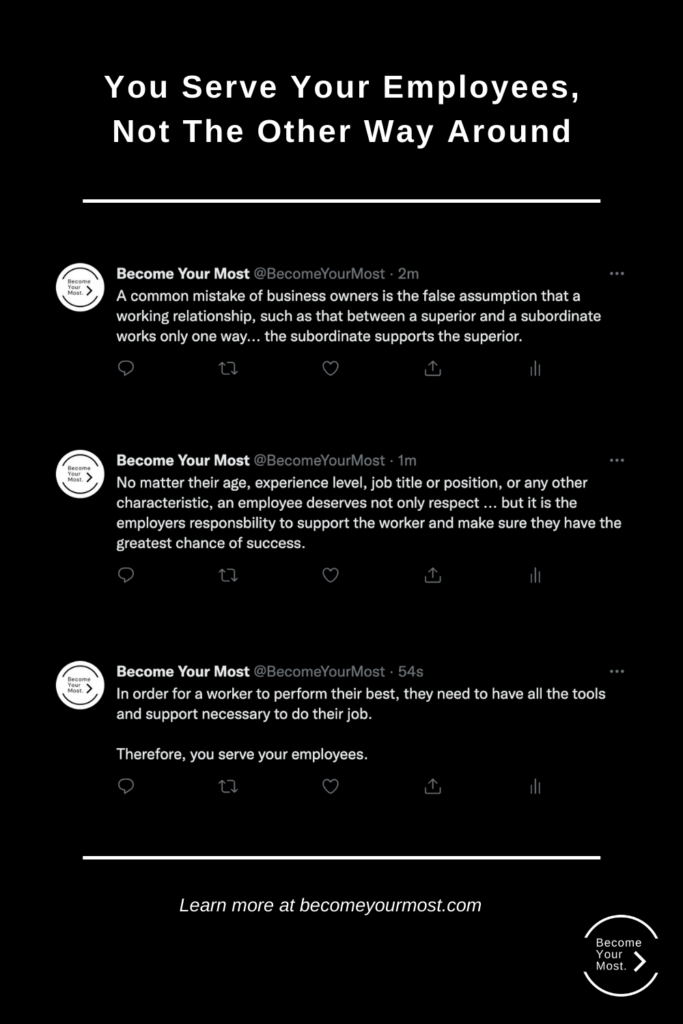
Own Everything
I once worked for a company that was always suspicious of their employees and untrusting.
When we were very obviously hit by a cyber attack, and no one could work for an entire week they still wouldn’t disclose what actually happened, and that was more frustrating than the actual incident.
Good managers own everything.
When you own your stuff, you show your employees that they should own theirs too.
Transparency is incredibly important because it shows your employees you care about them and trust them.
When you lie or fail to disclose the truth, and it comes out later, they will lose respect for you.
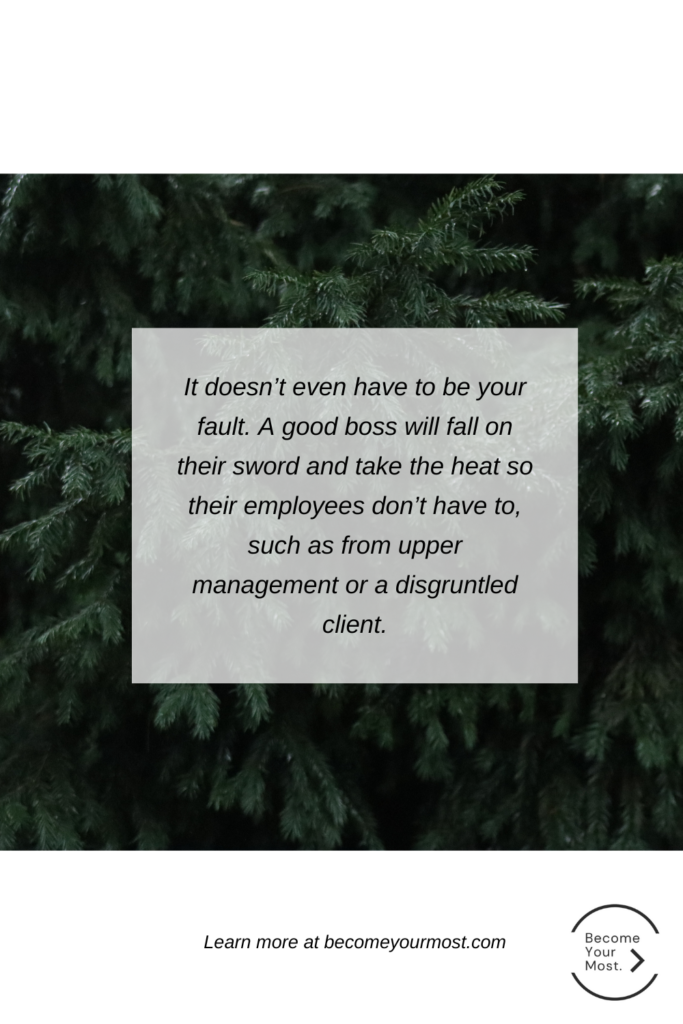
By earning your employees’ respect, you build an alliance with them, and by doing so, when you need it they will support you.
Know Your Employees
Have you ever heard of the false consensus effect?
I was at a lunch the other day with four coworkers.
I enjoyed their company, but I didn’t know them very well.
One started discussing her political beliefs based on her personal experience, which were heavily slanted toward one party.
It was obvious that she assumed she was in a space where we all shared her beliefs. She concluded that she appreciated “hanging out with other educated women”.
It was very obvious the other two women did not share her beliefs and it was very uncomfortable, especially because it seemed that she believed that people who share her beliefs are educated, and it was implied that if you don’t, you are not.
Can you say awkward?
False consensus effect is when one assumes that everyone else has the same beliefs as them.
Often this is revealed by one person essentially putting their foot in their mouth, so to speak.
I cannot begin to tell you how many people in corporate jobs have assumed I enjoy golfing ⛳️ (and other professional sports) and drinking, two staples of American corporate leisurely activities.
Many employers assume that everyone shares the same interests as them, and then think they are doing their employees a favor by “treating” them to free sports team tickets or a happy hour.
For some, that is an awesome perk, and to others, it’s an invasion of their personal time.
A “treat” is not a treat if the receiver doesn’t like it.
It’s what we all learned in grade school … everyone is different.
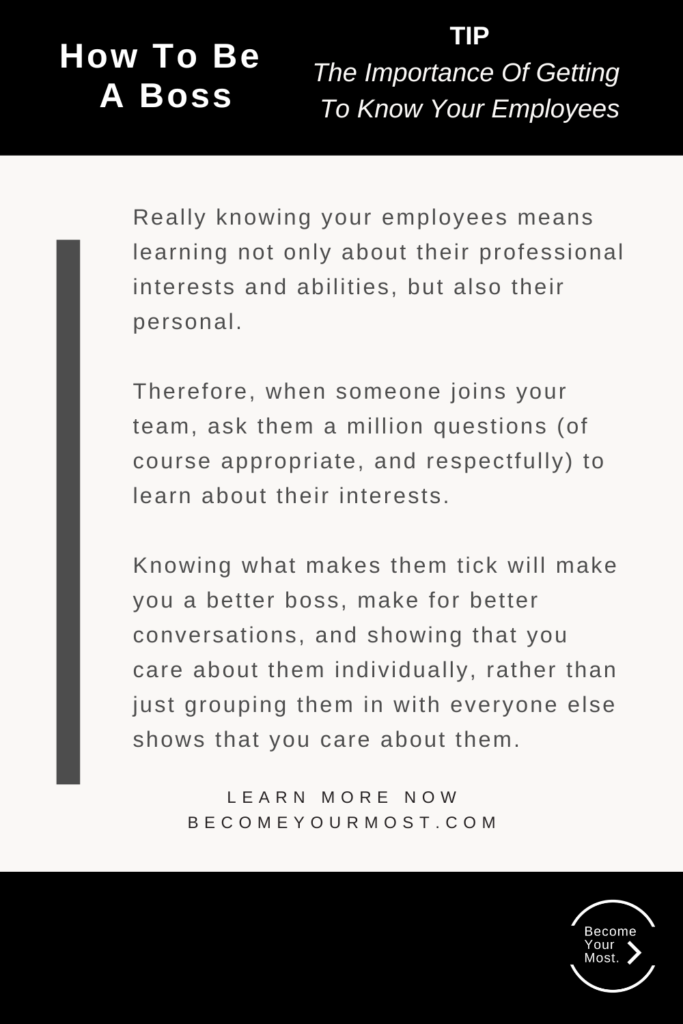
Approachability And An Open Door

People LOVE to talk about themselves.
I cannot tell you how many thousands of minutes of meetings have been wasted on a boss telling us a tale about someone non-work related, knowing that they could because no one would dare interrupt them (or tell them to stop).
Many bosses assume that their employees like listening to their stories or even enjoy talking to them.
However, many employees are:
- Afraid of their boss’s reaction
- Worried about their job security
- Stressed that their disinterest could affect their salary
Approachability is having a personality trait in which others feel they can talk to them, be honest, confide in them, or ask for help.
Being approachable is incredibly important as a manager because when people feel they can talk to you, be honest and confide in you, or ask you for help you are essentially in the know. ❤️ 👉 🧠
Being approachable results in benefits such as:
- Understanding your employees as people and what makes them respond better.
- You can learn about problems before they happen and have an ear to the ground.
- You can be made aware of current problems such as an employee needing help.
Approachability is extremely important if you want better connections with your employees if you want them to trust you and be loyal to you, and ultimately it can help your business because you aren’t being kept in the dark.
Going The Extra Mile
I had a couple of managers in my life that I could always bet on being on their computer late at night, simply because they wanted to get ahead, were working on projects to make their employees’ lives easier, and because they believed in their cause.
The other team members and I always really respected that.
Demonstrating consistent, added effort is extremely important to model to employees.
Not only will it make them respect you, but it will also add an element of loyalty.
People will appreciate you looking out for you. Going above and beyond expectations is personal.
We all understand that work is taxing, so putting in consistent hard work shows that you care about your employees.
This could come back to help you later because your employees will vouch for you when you need it.
It’s what they say… what goes around comes around.
Understand The Phrase: Work-Life Balance
I once worked for a company that would allow their managers to go on vacation, but the executives would call them at all hours of the day… while they were on the beach, weekends, as early as 4 in the morning and 11 at night … they never got a break.
I spoke to a few a couple of years later after they had left the company and they said they still felt stressed on a Saturday morning that they would be getting an angry call from management.
Taking off time is already hard enough for many, due to other issues like:
- the burden of their workload.
- guilt.
- debt or other financial strains.
- fear of job security.
- discrimination or prejudice.
- company miscommunications.
- not being able to find people to cover.
Not to mention, it is especially hard in countries like the United States, which is the only country without paid leave.
Many companies offer it, but it is not guaranteed, and even the time granted is still significantly lower than in other countries.
Check out this chart from Statista
“This chart shows statutory minimum paid leave and public holidays in 2020 in selected countries.”
You will find more infographics at Statista
Bosses and business leaders need to understand the importance of taking time away.
That means powering off, not having to worry about work, and having the space to do so.
👉 A study conducted in 2018 called “Project: Time Off” found that 78% of bosses agree that actually taking vacation time improves the attention of their employees, and reduces the effects of burnout by a whopping 81%.
This should be a huge wake-up call!
Taking time off is beneficial to employees, and it is beneficial for business owners.
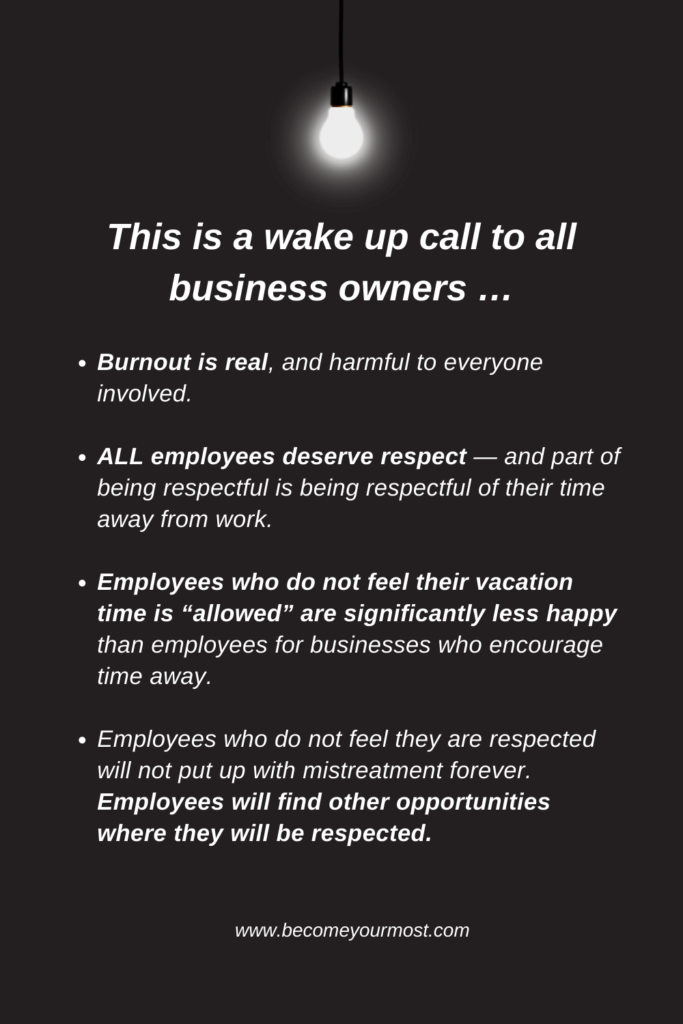
DEFINING AND UPHOLDING CLEAR EXPECTATIONS
I once worked for a company that expected its workers to work 60, 80, or even 100-hour work weeks … nights, weekends … essentially non-stop.
They were a small business, and they didn’t feel they should disclose those expectations until after hiring their employees, so they were essentially trapped in a cycle of either never meeting expectations, or working until extreme burnout.
This is one of the best tips. Want to know how to become a manager – and a good one? 👇
Not defining clear expectations is a recipe for disaster.
- It can contribute to burnout and exhaustion.
- Resentment and a disgruntled workforce.
- Mistakes and confusion.
- Unbalanced workloads and employees either being over or underwhelmed.
- Employees never meet expectations.
- Gaps and work projects falling through the cracks.
- Disorganization.
The list goes on…

Create Structure And Organization
I once had a manager who was extremely scatterbrained but refused to write anything down.
He would barge into people’s offices and demand they remind him of tasks.
Things would fall through the cracks and many helpful good ideas, projects, etc. were long forgotten.
- Effective bosses create structure and organization. They create workflows so expectations roles and projects are clear.
- Effective bosses create procedures to protect their business and their employees.
- Effective bosses keep their files and records secure, easily accessible, and organized by creating proper naming conventions.
- Effective bosses create an understanding of hierarchy.
- Effective bosses can connect individuals with the proper resources they need.
- Effective bosses keep an organized schedule and meet frequently with their employees (at least once a week, but certainly preferably once a day).
- Effective bosses create or arrange for someone to keep organized pay records, policies, procedures, and schedules to ensure that everyone is paid fairly and consistently.
- Effective bosses are good at managing their time to ensure their employees have easy access to them when they need help.
- Effective bosses control and track the work done by their employees to ensure everyone is meeting expectations, and that the workload is balanced.
- Effective bosses look for ways to make improvements, are decisive when making decisions, and are always finding ways to make their employee’s work easier and more efficient.
Prioritize Quality Training
I once worked for a company that spent three months training a class of employees — paying for their room and board, lunches, executives to come speak to them, workbook materials, etc. for training that could have been a 1-hour training.
They even used a random executive from a business channel partner (not even an employee in their firm) to train us.
It felt like a waste of time, especially for a job that was incentive-based.
By the end of the year, there were 4 remaining of the original 13 new hires.
Training is one of the most overlooked areas of a business.
Average bosses assume that employees will just “figure it out”. While that may be true for some, many will find that not instilling proper training can lead to costly efforts later.
The benefits of good training:
- Expectations are clear rather than based on assumptions — for both the employees and the bosses for the work that will be completed.
- Significantly less wasted time in explaining later how to, for example, name files, how to find resources and data, etc. — and much higher quality work done in the long run.
- Employees who are trained well can help their peers — which will save business owners time.
- Employees are more productive when they know how to find what they need, where they can get it, who they can meet with, etc. — which leads to higher productivity rates equaling higher profits and happier customers.
Praise and Understanding
I’ve had bosses of all types.
I’ve had bosses who overpraise to the point where it becomes disingenuine, and I’ve had bosses who never praise their employees leaving us always wondering if we were meeting expectations
… and I’ve had the worst boss of all who praises entirely the wrong things … such as “You look nice today, you look is more professional” rather than, “You did a good job on that assignment”.
Don’t be that person.
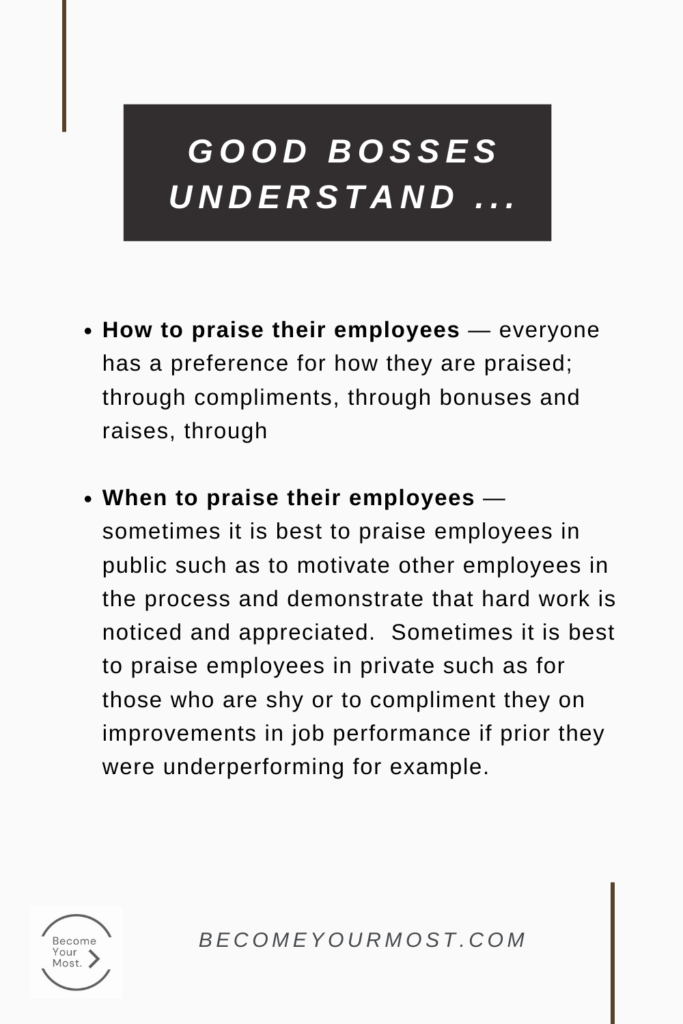
Praise for hard work, going above and beyond, etc. is one of the best motivational tools a boss can utilize… and it’s free.
It can be more meaningful than even buying an employee a gift, such as a drink at the golf course.
People appreciate being appreciated and are going to be much more motivated to go above and beyond if they are incentivized to do so through encouragement and validation.
Understanding is an incredibly important, careful line to walk.
Once I was in a meeting where an employee had not had time to complete a project, and admitted that on the meeting, but promised to work on it as soon as she could.
Instead of my boss getting angry with her, embarrassing her, etc. my boss was understanding because she is a patient person and took the time to listen to the employee’s rationale.
She turned it around by saying, “No problem, just focus on it today and try to get it wrapped up by the end of the day”. She was understanding and kind about it, and set clear expectations.
Of course, my boss could be letting her off the hook for not completing the project on time, and there are certainly people who will take advantage of that, which is why it is important to be clear with expectations upfront so there is no question, and to ultimately hold everyone accountable.
👉 It is entirely situational so it is important to be cognizant, looking for patterns of behavior, assuming innocence first, and being kind regardless.
Summary
Now you know how to become a manager — and a good one!
You need to understand how to navigate the dynamic of managing different personalities, and situations, and how to make the lives of their employees as stress-free as possible.
Everyone benefits from bosses understanding these golden rules of how to be a good boss; employees, their clients, and especially bosses.
Sources
Bellet, Clement and De Neve, Jan-Emmanuel and Ward, George, Does Employee Happiness have an Impact on Productivity? (October 14, 2019). Saïd Business School WP 2019-13, Available at SSRN: https://ssrn.com/abstract=3470734 or http://dx.doi.org/10.2139/ssrn.3470734
https://www.statista.com/chart/15005/statutory-minimum-paid-leave-and-public-holidays/






